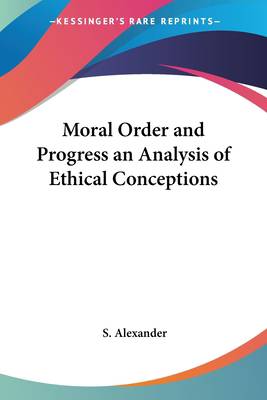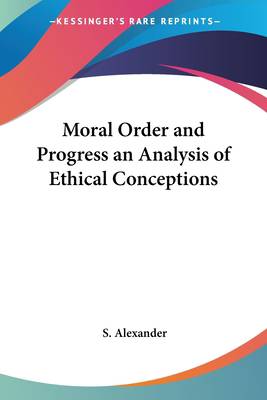
- Retrait gratuit dans votre magasin Club
- 7.000.000 titres dans notre catalogue
- Payer en toute sécurité
- Toujours un magasin près de chez vous
- Retrait gratuit dans votre magasin Club
- 7.000.0000 titres dans notre catalogue
- Payer en toute sécurité
- Toujours un magasin près de chez vous
51,45 €
+ 102 points
Description
""Moral Order and Progress: An Analysis of Ethical Conceptions"" is a book written by S. Alexander that explores the different ethical conceptions that have emerged throughout history. The book is divided into four parts, each of which focuses on a different aspect of ethical thought. The first part examines the origins of ethical thinking and the role of religion in shaping ethical beliefs. The second part looks at the development of secular ethical theories, such as utilitarianism and deontology. The third part explores the relationship between ethics and politics, including the role of the state in promoting moral values. Finally, the fourth part considers the challenges facing ethical thinking in the modern world, including the rise of relativism and the impact of scientific discoveries on ethical beliefs. Throughout the book, Alexander argues that ethical thinking is essential for human progress and that a moral order is necessary for a just and prosperous society. The book is aimed at scholars and students of philosophy, ethics, and political theory, as well as anyone interested in the history and development of ethical thought.1889. This work grew out of Alexander's dissertation for which he obtained the Green Moral Philosophy Prize at Oxford. The substance of the book is an account of the various elements contained in moral order and moral progress; the subtitle describes its method, which is that of grouping together ethical facts under the main working conceptions used in morality. The work is divided into the following Books: Preliminary-Conduct and Character; Statical-Moral Order. Part I. Moral Predicates and Part II. The Moral End; and Dynamical-Moral Growth and Progress.This scarce antiquarian book is a facsimile reprint of the old original and may contain some imperfections such as library marks and notations. Because we believe this work is culturally important, we have made it available as part of our commitment for protecting, preserving, and promoting the world's literature in affordable, high quality, modern editions, that are true to their original work.
Spécifications
Parties prenantes
- Auteur(s) :
- Editeur:
Contenu
- Nombre de pages :
- 440
- Langue:
- Anglais
Caractéristiques
- EAN:
- 9781417949601
- Date de parution :
- 20-09-04
- Format:
- Livre broché
- Format numérique:
- Trade paperback (VS)
- Dimensions :
- 152 mm x 229 mm
- Poids :
- 639 g

Les avis
Nous publions uniquement les avis qui respectent les conditions requises. Consultez nos conditions pour les avis.






